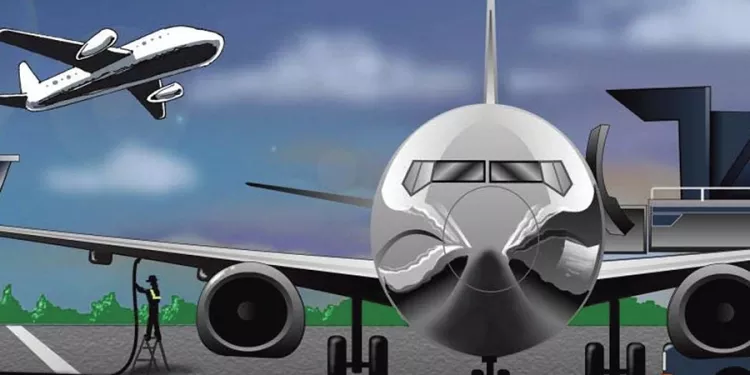The House of Representatives alongside the Nigerian National Petroleum Company Limited (NNPC) and the Central Bank of Nigeria (CBN), held a meeting yesterday with the embattled Airline Operators of Nigeria (AON) who are facing a significant surge in the cost of aviation jet fuel (Jet A1) which accounts for c.40% of their operational costs.
The quartet resolved to allow the NNPC to supply Jet A1 to marketers nominated by airline operators for three months and at a fixed price of N480 per litre. Based on a news report, the airline operators nominated 10 marketers to do this. Also, while a temporary relief is in place, the airline operators were advised to begin the necessary steps involved in applying for a licence to import aviation fuel for their usage.
Last week, the local airline operators threatened to halt flight operations effective yesterday over the high cost of aviation fuel with its attendant impact on cost of operations and conditions of service that has thrown many operators off guard. Notably, since the start of the year, many airline operators have complained about the rising cost of jet fuel, further worsened by scarcity which led to flight delays and cancellations.
As of February 2022, reports emerged that the cost of Jet A1 moved from c.N190-230/litre to the range of N410- N430/litre varying across states. Without delay, most airlines based on our survey raised airline tickets as high as 40%. As the Russian invasion emerged, jet fuel has been on the rise since it is a deregulated product. While the airline operators claim that cost of jet fuel is currently at c.N700/litre, the Major Oil Marketers Association of Nigeria (MOMAN) debunked the claim, stating that the price of aviation fuel is around N500-N550/litre since
the NNPC had intervened through crude swaps.
The aviation sector was one of the sectors worst hit by the pandemic, causing airlines to abandon the skies and punctuating the interesting prospects of that year. The sector recorded negative growth of 36.98% in 2020 from a GDP growth of 13.2% in 2019. Currently, the sector which was once on its knees has gotten back to its feet as the green shoots of recovery are emerging. From the Q4 2021 GDP report, the sector grew 19.7% in 2021, returning to pre-pandemic levels. The reopening of the economy in Q3 2020 and price increments by operators are factors that have supported growth. Also, the low base in 2020 and intervention in form of a N4.0bn bailout fund by the government must have aided the growth seen.
We commend the government for the quick response to the plight of the striking operators given the systemic importance of air travels to the conduct of trade and other economic activities in the country. Moreso, with the heightened insecurity in the country, many commuters/passengers can not afford to lay at the feet of terrorists/bandits who have taken over major road highways, making air transport one of the safest channels for transport.




